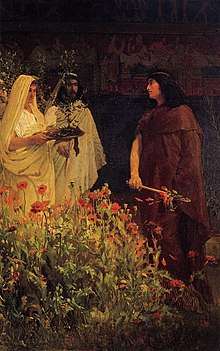Tall poppy syndrome
The tall poppy syndrome describes the cultural phenomenon of mocking people who think highly of themselves, "cutting down the tall poppy". Common in Australia and New Zealand, it is seen by many as self-deprecating and by others as promoting modesty.[1][2][3][4][5][6]
Etymology

The concept originates from accounts in Herodotus' Histories (Book 5, 92f), Aristotle's Politics (1284a), and Livy's Ab Urbe Condita Libri, Book I.[7] with reversed roles, referring to Periander's advice to Thrasybulus via a herald.
The specific reference to poppies occurs in Livy's account of the tyrannical Roman king, Lucius Tarquinius Superbus. He is said to have received a messenger from his son Sextus Tarquinius asking what he should do next in Gabii, since he had become all-powerful there. Rather than answering the messenger verbally, Tarquin went into his garden, took a stick, and symbolically swept it across his garden, thus cutting off the heads of the tallest poppies that were growing there. The messenger, tired of waiting for an answer, returned to Gabii and told Sextus what he had seen. Sextus realised that his father wished him to put to death all of the most eminent people of Gabii, which he then did.[8]
The earliest English-language example of Tall Poppies being used as a metaphor for notables may be found in Roger L'Estrange's newspaper, The Observator, in 1710. One party to a dialogue relates the tale of Tarquin, and later observes approvingly of his Royalist allies, "If you'll have but a little Patience, you may see them make very noble Efforts towards striking off the Heads of the tall Poppies."[9]
Australia and New Zealand
Use of the phrase is first documented in 1864,[10] with the common usage appearing after the publication of Susan Mitchell's best-selling book Tall Poppies in 1984 in which Mitchell interviewed nine successful Australian women.[11]
The term is used in the same manner in New Zealand[12] – people are expected to be humble and self deprecating, "as though excellence or superiority in a particular field somehow represented a rebuff to ideas of equality".[13]
Ireland
In Ireland, especially the traditionally-Catholic Republic of Ireland, it is prevalent within the culture to encourage humility in yourself and others. People perceived to be tall poppies will often be described as "getting notions about themselves" and the cautionary words of '"don't go getting notions about yourself" will meet any boastful remarks.[14] This culture is most obvious in the Irish people's notorious cutting-down of Irish celebrities.[15] The phenomenon in Ireland is attributed to Irish Catholic guilt, as well as a postcolonial disdain for pomp and monarchy due to historic issues regarding Ireland–United Kingdom relations. By extension, this culture of keeping people in their place can be observed in the Irish-American communities of Boston and New York City.
Northern Europe
The concepts of Jantelagen or "Law of Jante", in Scandinavia, and A kent yer faither (English: I knew your father) in Scotland, are very similar. Similar phenomena are said to exist in the Netherlands (where it is called maaiveldcultuur).
See also
References
- Kennedy, Jeffrey (2007). "Leadership and Culture in New Zealand". In Chhokar, Jagdeep; Brodbeck, Felix; House, Robert (eds.). Culture and Leadership Across the World: The GLOBE Book of In-Depth Studies of 25 Societies. United States: Psychology Press. p. 399. ISBN 978-0-8058-5997-3.
- Luby, Miranda (12 June 2017). "Why are Australians so laid back?". BBC. Retrieved 22 November 2017.
- Pryor, Lisa (1 May 2017). "The End of the Australian Dream?". New York Times. Retrieved 22 November 2017.
- Mitchell, Carol Vallone (1 August 2016). "A Cautionary Tale for Tall Poppies and Women Leaders". HuffPost. Retrieved 22 November 2017.
- "Tall Poppy Syndrome". Kiwianarama. 7 April 2009. Retrieved 22 November 2017.
- Chougule, Pratik (22 April 2017). "How America Turned Against Smart Kids". The American Conservative. Retrieved 22 November 2017.
- Rackham, H. (1944). Aristotle in 23 Volumes. Volume 21. Cambridge, MA: Harvard University Press.
- Livius, Titus. "The Earliest Legends: 1.54". The History of Rome, Vol. I. University of Virginia Library: Electronic Text Center.
- The Observator (London), 6 December 1710, p.1.
- Empire (Sydney, NSW : 1850–1875, newspaper), 8 December 1864, p.5.
- Mitchell, Susan (1984). Tall poppies nine successful Australian women talk to Susan Mitchell. Ringwood, Victoria, Australia Penguin Books. ISBN 978-0140072105.
- Spacey, S. (2015). "Crab Mentality, Cyberbullying and 'Name and Shame' Rankings". Retrieved 19 April 2015.
- Levine, Stephen (20 June 2012). "Political values - Political values and the 'Kiwi' way of life". Te Ara: The Encyclopedia of New Zealand. Retrieved 12 March 2020.
- Mc Bride, Aoibhinn. Evoke. Evoke.ie https://evoke.ie/2017/01/20/style/fashion-fix/having-notions. Retrieved 12 March 2020. Missing or empty
|title=(help) - Sweeney, Tanya. Irish Independent. Independent Media https://www.independent.ie/woman/celeb-news/tall-poppy-syndrome-why-we-irish-love-to-hate-our-celebs-26737771.html. Retrieved 12 March 2020. Missing or empty
|title=(help)
Further reading
- Feather, N. T. (1989). "Attitudes towards the high achiever: The fall of the tall poppy". Australian Journal of Psychology. 41 (3): 239–267. doi:10.1080/00049538908260088.
- O'Neill, Thomas M. "Tall Poppy Syndrome: Bentham's Utilitarianism in Australia" (PDF). Viterbo University. Archived from the original (PDF) on 20 August 2006. Retrieved 28 April 2015. Cite journal requires
|journal=(help) - Peeters, Bert (2004). "Tall poppies and egalitarianism in Australian discourse" (PDF). English World-Wide. 25 (1): 1–25. doi:10.1075/eww.25.1.02pee. ISSN 0172-8865. Archived from the original (PDF) on 12 September 2009. Retrieved 28 April 2015.